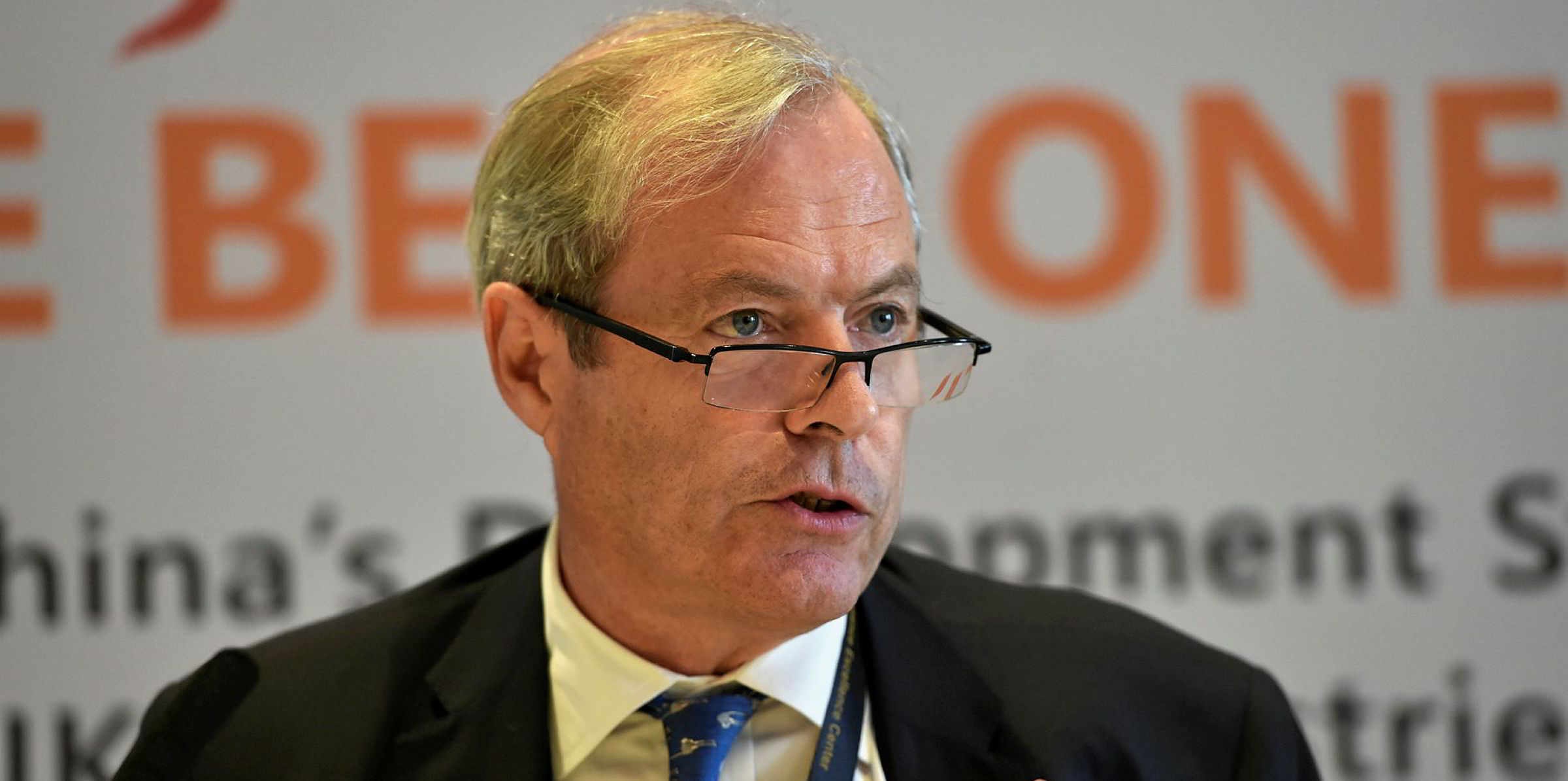Hamish Norton knows a thing or two about how finance drives shipping. For 28 years before becoming president of Star Bulk Carriers in 2012, he was a Wall Street rainmaker as an investment banker working with some of the world’s leading shipping companies.
This summer, while talking about the future era of tighter rules for carbon emissions from ships, the straight-talking Norton told the Financial Times that most owners are not looking beyond the next few years. “It’s not a shipowners’ problem yet,” he said. “There are no mandates from regulators. It’s quite frankly nobody’s problem yet.”
Such blunt comments have resonance, since, despite much talk, there remain no internationally agreed rules on decarbonisation. And his words deserve to be taken seriously, since Norton speaks as a senior executive of the world’s largest listed pure-play dry bulk owner, with a fleet of 120 ships totalling 13m dwt.
His comments also show how fast decarbonisation is moving up the business and political agenda in ways that are outside the control of industry insiders.
Within days of his speaking, 11 financial institutions accounting for ship finance totalling around $100bn of the $450bn outstanding to the industry signed a commitment to cut the carbon pollution from the fleets they finance.
These Poseidon Principles have been interpreted as a significant step that will have an impact on which ship projects secure finance. To put it bluntly, the initiative has made decarbonisation very much a problem that shipowners need to deal with.
Few had expected such an explicit and active intervention in the decarbonisation debate by a big group of finance providers quite so soon.
Shipping’s inherent culture of waiting for implementation of the IMO’s slow-moving rule-making meant the issue had been seen as political rather than practical.

Shipping was excluded from the United Nations’ 2015 Paris agreement on climate change, although it is responsible for 2.2% of total emissions, comparable with a major economy such as Germany.
UN countries delegated the question to their representatives at the IMO, which in April 2018 made the landmark pledge to cut greenhouse gas emissions by 50% from 2008 levels by 2050, although detailed rule-making will take at least until 2023.
However, financial institutions and investors are acting faster than shipping’s regulators, moving to manage the risk they face from climate change and other social, environmental and governance concerns.
A model of the Poseidon Principles can be found in the Equator Principles, a risk-management framework that dates back to 2003 and has been adopted by 97 financial institutions in 37 countries.
The Equator Principles, which are about to see their fourth iteration, give institutions a way of assessing and managing their environmental and social risks — an approach echoed in the Poseidon Principles.
It is a trend driven by increased demands from regulators and investors for ever-more detailed and assertive management of the risk in banks’ portfolios.
Key architects of the Poseidon Principles, Citibank shipping head Michael Parker and Paul Taylor, head of shipping at Societe Generale, said at the initiative’s launch: “The Poseidon Principles offer significant benefits to the global shipping industry and society, and they allow us as banks to align and de-risk our portfolios in line with shipping’s green transition.”
Taylor told TradeWinds: “We are building leadership in shipping for those who want to be at the forefront of the sector. This is responsible banking for responsible shipping. It is about doing good business.”

Citigroup and Societe Generale were joined in the first wave of signatories by DNB, ABN Amro, Amsterdam Trade Bank, Credit Agricole CIB, Danish Ship Finance, Danske Bank, DVB, ING and Nordea.
The principles are perhaps the most effective response to have emerged from the Global Maritime Forum, shipping’s Davos-style network of opinion formers and decision makers.
At the heart of the Poseidon Principles is a clear, simple idea: each institution will use available data from every ship in its portfolio to calculate the total carbon emissions; and that total will then be cut year on year, in alignment with the IMO’s 2050 “absolute target”, by the financing of greener ships.
The devil, of course, is in the detail. As Taylor told TradeWinds: “The aim is to partner and support our clients as they adapt to the changes taking place in the market towards 2050.
“This will have an important impact on the market over time. It will change the dynamic. It brings climate change fully into the due diligence for every transaction.
“This is a very positive thing. There will be more liquidity for projects that reduce emissions. The flip side is liquidity may be more limited for others.”
This will have an important impact on the market over time. It will change the dynamic. It brings climate change fully into the due diligence for every transaction
Kristin Holth, global head of ocean industries at DNB, and another key driver of the approach, commented: “I think it is the industry’s responsibility to act on the IMO’s lead in reducing carbon emissions. It is a step in the right direction for the industry to map a practical way forward to a lower-carbon future.
“The initiative shows how the finance industry can have influence and assist clients to improve their businesses. We have a responsibility; we all have a responsibility in this. We must mobilise if we are to support sustainable business in a lower-carbon world.”
The building block on which the principles are based is the data shipowners are now obliged to collect and report to the IMO on their vessels’ fuel consumption. This was mandated under an amendment to the IMO’s Marpol Annex VI agreement, which entered into force in March 2018.
Owners should by now have monitoring plans in force and approved by their flag states, with the data anonymised and sent to the IMO to compile an accurate global industry profile.
Poseidon signatories will mandate their borrowers to send a copy of the data to them, enabling the calculation of the absolute carbon emissions, as well as the relative “carbon intensity”.
The banks’ focus on the carbon footprint of their fleets will potentially have major implications for the industry, although as Petter Haugen, shipping analyst at Kepler Cheuvreux, pointed out, the detail is not yet clear.
“This is a large and significant initiative and it is hard to understand the full and long-term consequences immediately,” he said following the announcement.
Tristan Smith, reader in energy and shipping at UCL Energy Institute in London, and an advisor to the team that drew up the Poseidon Principles, acknowledged that the implications of the initiative would take time to play out.
“The principles are a modest start and limited in what they achieve on their own. They are fully powerful only as and when the wider parts of the incentivisation/risk puzzle come into play, which I believe will happen, but take more time,” he told TradeWinds.
Smith rejects criticism that the principles should have focused solely on absolute emissions, since a loan portfolio’s total emissions are made up of its size and the carbon intensity of emissions from individual ships.
A benchmark measure of absolute emissions could risk banks claiming to have cut their carbon footprint merely by their loan portfolio having shrunk.
“One way around this is to report both. But by my estimate, this would then likely result in cherry-picking of whichever of the two told the best story, or at least apologising for one indicator with the other,” Smith said.
In a guidance note to clients, ship finance specialists at law firm Watson Farley & Williams — who provided legal oversight for the drafting of the Poseidon Principles — observed that there may be unintended consequences.
“It is possible that some financiers may choose to avoid or delay becoming signatories, or become signatories but nonetheless be prepared to continue to fund non-aligned ships on the basis that this is likely to become more profitable if owners of such ships struggle to find funding,” the firm commented.

Watson Farley & Williams does not expect the cost to owners of compliance to be onerous: “It is too early to say how much a classification society would charge for making the relevant calculations, but, as these are very simple and they will have the relevant information, it is anticipated that this should not be significant.”
Affinity Shipping said the principles would drive more owners to look at new fuelling options. “With extra incentives to comply with regulation, owners must look to longer-term solutions, with LNG the most likely fuel of choice going forward,” the shipbroker said in a research note.
LNG emits 10%-20% less CO2 than low-sulphur fuel oil and it is the option that would make the most sense, should owners wish to satisfy the banks as well as comply with the IMO.
“The banks may even go so far as to offer favourable funding for owners who are bold enough to lead the change and order LNG dual-fuelled vessels,” Affinity added.
A further lever may emerge in the guise of carbon emissions moving up the corporate governance agenda. Before his resignation from US investment bank Wells Fargo in July, shipping analyst Mike Webber said he intended to add compliance with the Poseidon Principles to his influential corporate governance scorecard.
“We’re trying to create a degree of alignment between the scorecard and the principles — if they need more teeth, we’re happy to be a molar,” Webber said.
“Rather than remaining a grumbling passenger or some sort of disenfranchised derivative, with enough support ideas like the Poseidon Principles could help the sector lead from the front.
“It’s easy to make issues or ideas like this hopelessly complex, but if you happen to think it’s just the right thing to do, in the end there’s not that much to really talk about.”
Poseidon’s key components
Assessment of climate alignment | Signatories will, on an annual basis, measure the carbon intensity and assess the climate alignment (carbon intensity relative to established decarbonisation trajectories) of their shipping portfolios. This requirement takes effect for each signatory in the calendar year after the year in which it became a signatory.
Accountability | Signatories recognise the important role that classification societies and other IMO-recognised organisations play in providing unbiased information to the industry and the mandatory regulation established by the IMO for the data collection and reporting of fuel oil consumption from ships. Signatories will rely on such entities and mandatory regulations as identified in the technical guidance for the provision of information used to assess and report on climate alignment.
Enforcement | Signatories will require that ongoing compliance with the Poseidon Principles is made contractual in their new business activities, using standardised covenant clauses. They will contribute to the updating and addition of standardised clauses through the annual review process, and will agree to work with clients and partners to covenant the provision of information to calculate carbon intensity and climate alignment.
Transparency | The signatory will publicly acknowledge that it is a signatory of the Poseidon Principles. On an annual basis, it will report the overall climate alignment of its shipping portfolio and supporting information, as per the accountability requirements, to the secretariat no later than 30 November. Each signatory will publish annually the overall climate alignment of its shipping portfolio in relevant institutional reports on an appropriate timeline.





